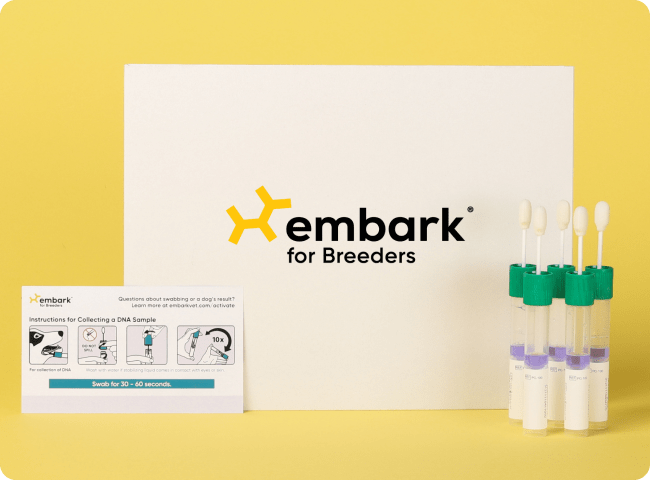Genetics is part of the puzzle when it comes to canine health testing prior to breeding. An eye screening exam is one of the most common physical (phenotype) health tests for dogs. Responsible breeders aiming to produce healthy puppies will conduct annual eye testing on both parents prior to breeding. Testing both parents is a must in order to produce the healthiest puppies possible.
Eye certification is one of the phenotypical evaluations that are registrable with the Orthopedic Foundation for Animals (OFA) through its Companion Animal Eye Registry (CAER). Embark currently tests for 250+ genetic health conditions. Many of them are also registrable with the OFA.
The Test
Most eye diseases are presumed hereditary. Many of them occur later in a dog’s life. This test can be performed at the vet’s office, during an eye clinic, or at health clinics hosted by kennel clubs around the country. The American College of Veterinary Ophthalmologists (AVCO) can also help you find a board-certified ophthalmologist in your area to conduct the test. It’s important to note that this exam is not a comprehensive ocular health examination. It is an eye screening exam. OFA recommends annual screening for breeding animals. OFA CAER Certification is for a 12-month period.
The Method
The eye exam and CAER certifications is conducted by a board-certified veterinarian certified by the American College of Ophthalmologists. According to the OFA, the exam is performed 30-40 minutes after drops are placed in the eyes to dilate the pupils. In a darkened room, the examiner uses indirect ophthalmoscopy and slit lamp biomicroscopy to perform the screening. If a serious ocular health problem is found during the exam, a comprehensive exam may be required. This screening is for the observable phenotype of the dog. It’s important to note that a clinically normal animal may be a carrier of an abnormal genotype.
The Age
Dogs can be tested at any age from puppies to adults. Certain disease processes are only visible on an eye exam at specific times in a dog’s life, which is why it’s recommended to repeat exams.
The Results
A universal form is used to record the results. CAER certification can be normal or a dog will receive no certification.
The American College of Veterinary Ophthalmologists lists the following diseases as automatic fails for CAER certification because these conditions cause blindness in one or more breeds and there is strong evidence that the condition is hereditary. Breeding animals with these conditions is not recommended unless a known non-genetic reason for the condition is apparent like trauma, certain metabolic diseases, nutritional deficiencies, or other eye inflammation causes.
- Keratoconjunctivitis sicca (KCS)
- Cataract
- Lens luxation or subluxation
- Glaucoma
- Persistent hyperplastic primary vitreous (PHPV)
- Retinal detachment
- Retinal dysplasia Optic nerve coloboma
- Optic nerve hypoplasia
- Optic nerve coloboma
- Progressive Retinal Atrophy (PRA)
Breeding advice is offered based on the guidelines established for that specific breed by the ACVO Genetics Committee.
The Orthopedic Foundation of America is a leading canine health registry and public database. For more information on genetic health testing, Embark offers a search tool which lists all 250+ genetic health tests Embark offers.




